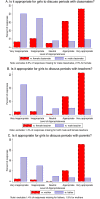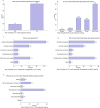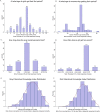Period teasing, stigma and knowledge: A survey of adolescent boys and girls in Northern Tanzania
- PMID: 33112868
- PMCID: PMC7592731
- DOI: 10.1371/journal.pone.0239914
Period teasing, stigma and knowledge: A survey of adolescent boys and girls in Northern Tanzania
Abstract
Emerging evidence suggests that menstruation-related teasing is a common experience among adolescent girls with ramifications on their school participation, yet empirical evidence on the prevalence and determinants of period teasing in schools remain scarce. Menstrual hygiene research and policies almost exclusively focus on girls and women, leading to a dearth of knowledge of male attitudes. We conducted the first quantitative survey of period teasing in schools in sub-Saharan Africa, focusing on 432 male and 524 female students in four co-educational secondary schools in northern Tanzania. Period teasing is prevalent; 13% of girls have experienced period teasing, and more than 80% fear being teased, especially by male classmates. Girls' fears are associated with insufficient menstrual hygiene management resources and practices. Girls cope by reducing school attendance, participation, and concentration in the classroom during periods. Boys engage in period teasing because they perceive periods as embarrassing, especially visible markers of periods (odor or stains). Social norms, such as peer behavior and home restrictions on menstruating women, are associated with more teasing. Boys believe it is strongly inappropriate for girls to reveal period status or to discuss periods with males, including male teachers. In contrast, boys are well informed about basic biological facts of menstruation (scoring 60% on a knowledge quiz, not statistically different from the girls) and have received information from school curricula and health workers. Lack of suitable menstrual hygiene practices and restrictive social norms is correlated with period teasing, which hinders gender equality in educational opportunities. Providing narrowly bio-medical focused education about menstruation may not be enough to reduce period teasing in contexts with period stigma.
Conflict of interest statement
The authors have declared that no competing interests exist.
Figures






References
Publication types
MeSH terms
LinkOut - more resources
Full Text Sources
Medical

